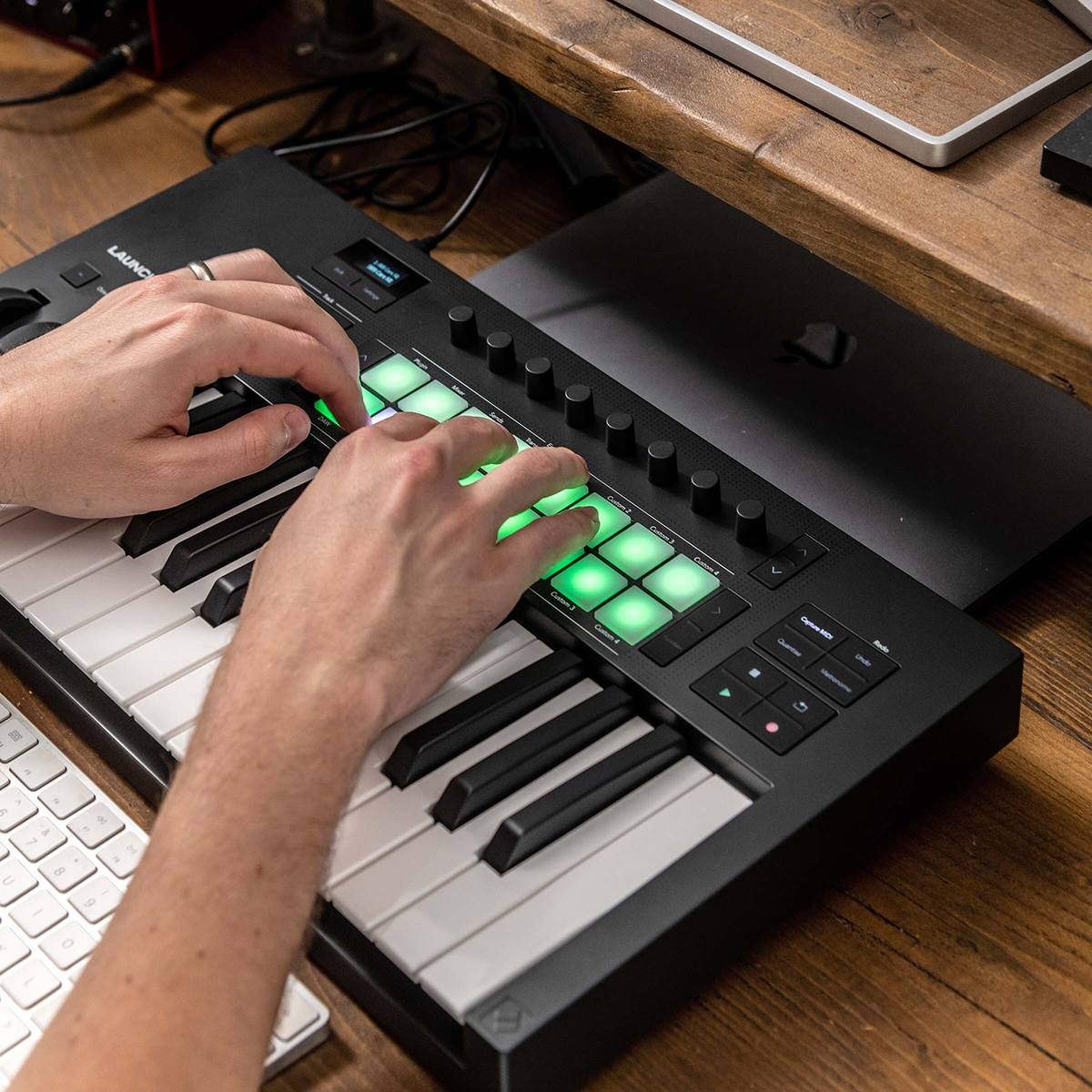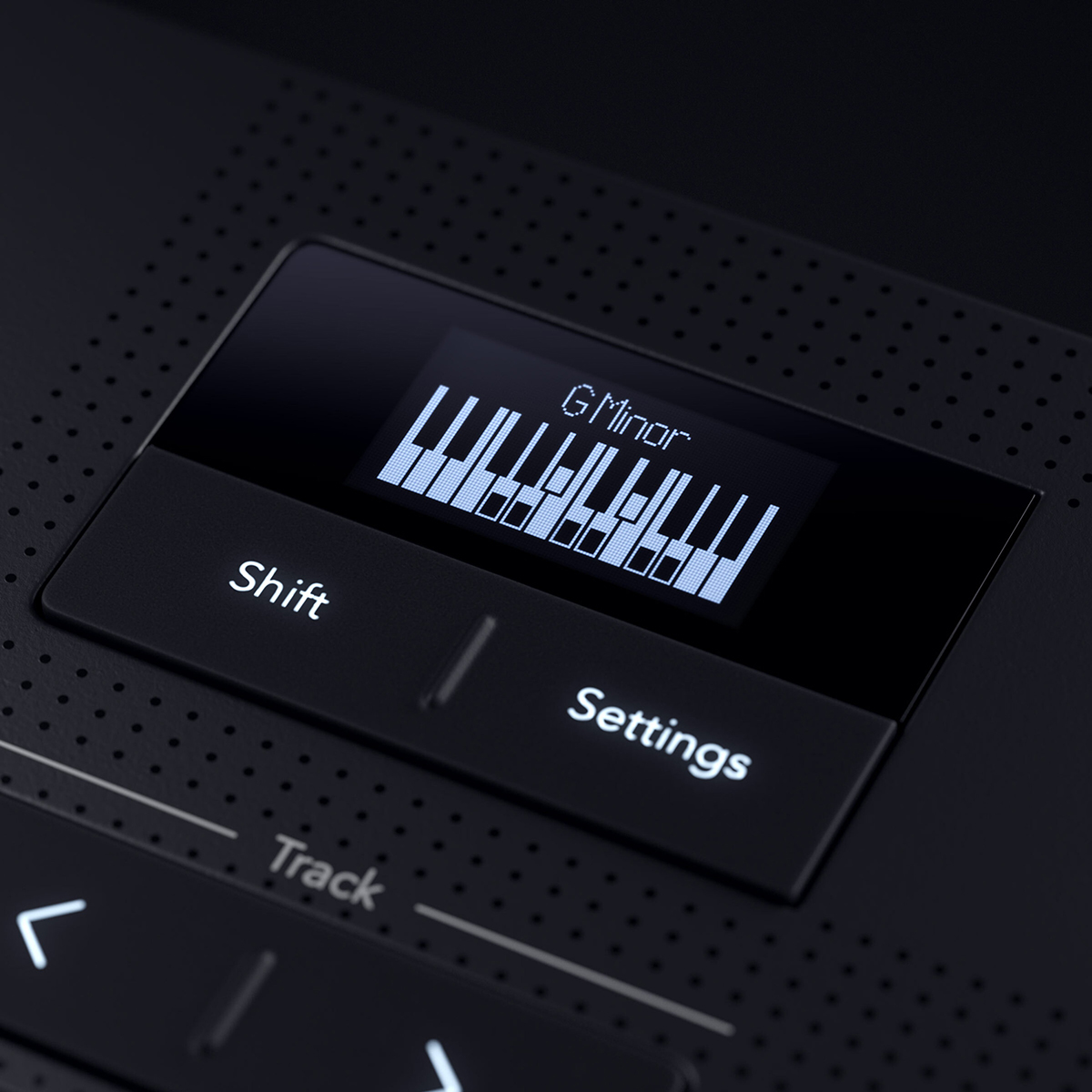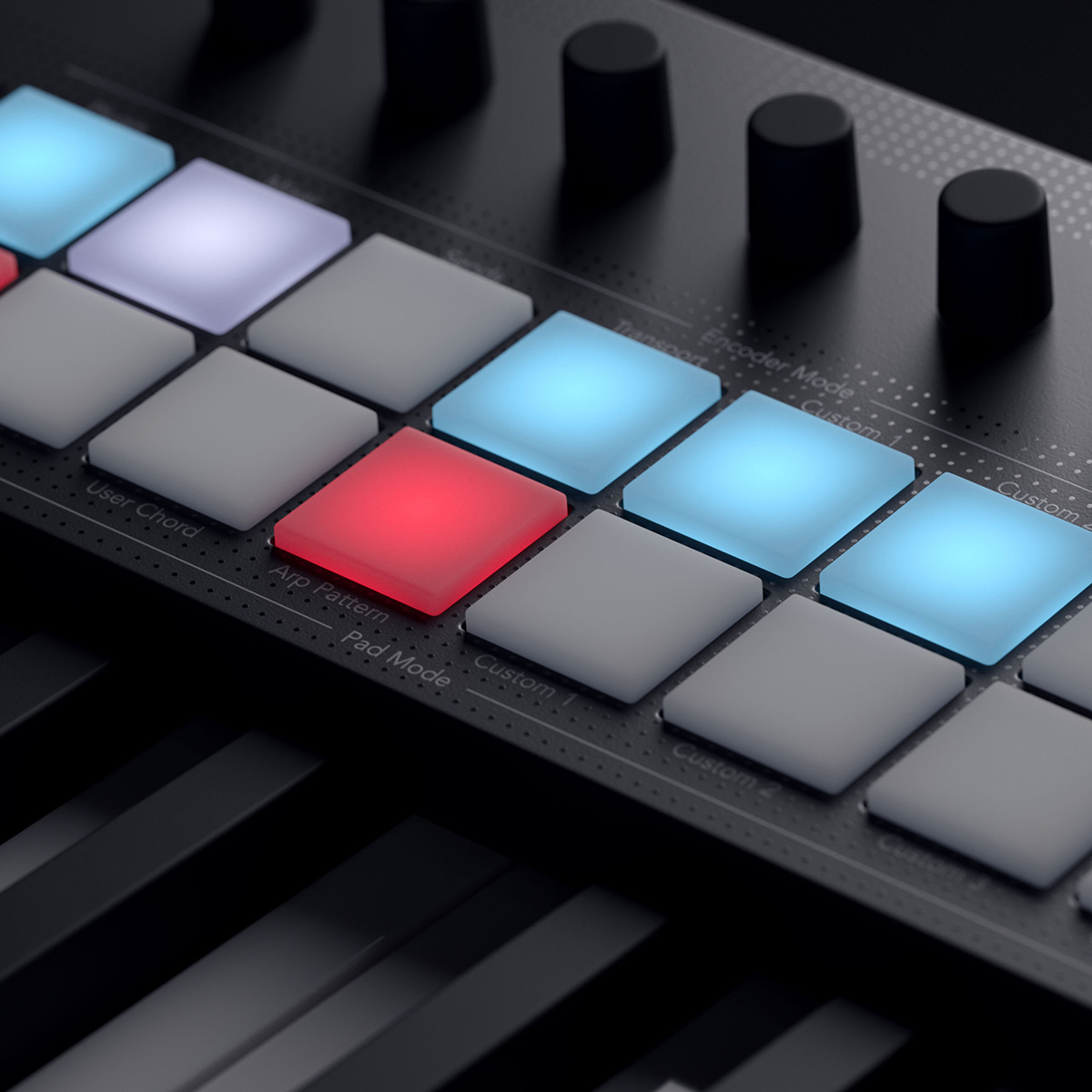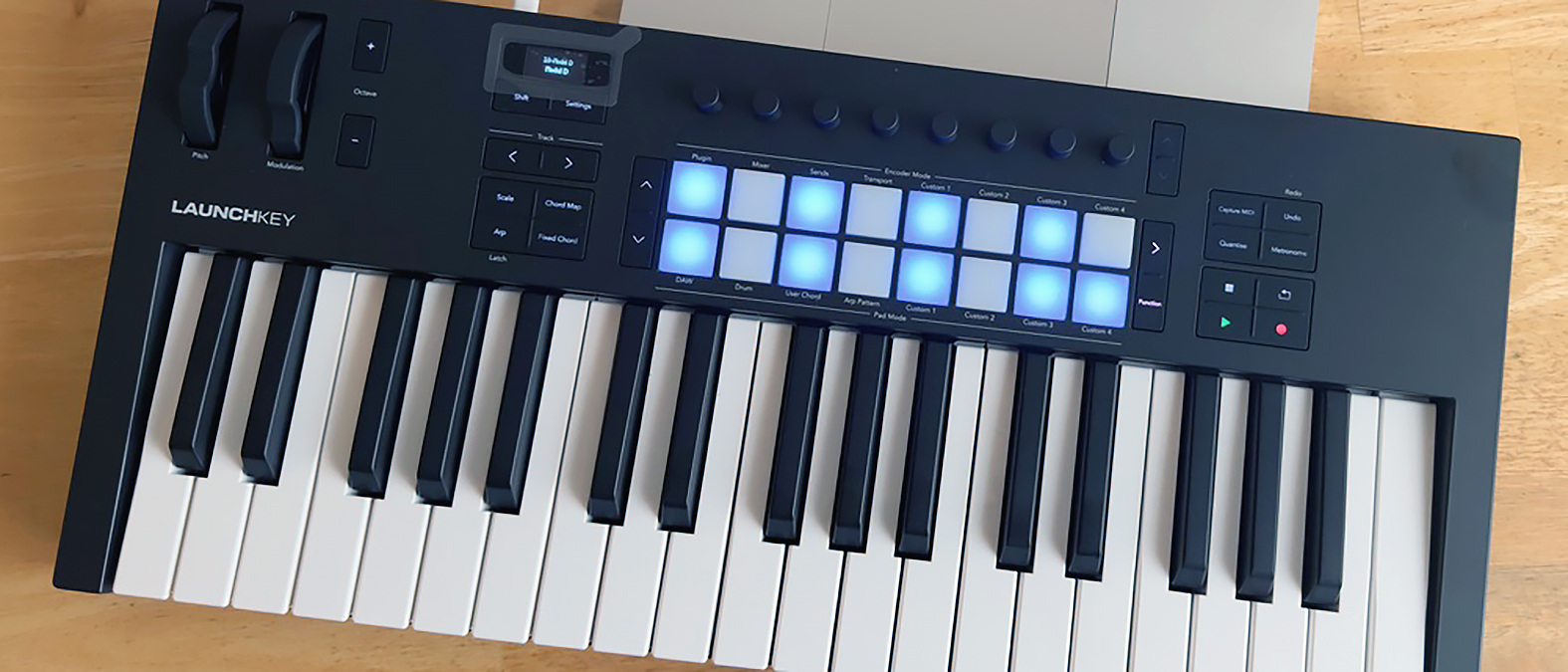MusicRadar Verdict
The updated Launchkeys are just as good as controllers as they are keyboards. Use them with your favourite software or hardware, and these versatile devices will take care of pretty much everything for you.
Pros
- +
Proper decent synth-size keys.
- +
The same excellent feature set that applies across the Launchkey MK4 range.
- +
Full-size MIDI DIN output.
Cons
- -
Split keyboard only available in 49/61 semi-weighted versions.
- -
Can’t see encoder values without touching the OLED.
MusicRadar's got your back
Novation Launchkey MK4 25 and 37: What is it?
Novation has released the Launchkey MK4 range, including 25 and 37 mini keyboards, 49 and 61 semi-weighted versions, and these, the 25 and 37 synth-action models. They share common features, and the same software bundle. Novation has been big on the MIDI keyboard/controller scene since the 1990s, and is still holding its own against offerings from Akai Professional, Arturia, and Native Instruments, amongst others.
These Launchkeys are monochrome monoliths – in their unpowered state there’s no colour whatsoever. The 25 and 37 are identical, other than the number of keys. As well as the keys, you’ll find (from left to right) pitch and mod wheels, octave buttons, an OLED display, and buttons for track navigation, Scale and Chord modes, Arpeggiator, Fixed Chords, and Shift and Settings. Next to that are two buttons to scroll Ableton’s famous Session View box, two rows of eight pads, and eight encoders. Then there’s a function button, encoder bank select buttons, then finally buttons for transport, Capture MIDI, Undo, Quantize, and Metronome.
At the back, are a USB-C connection, 5-pin MIDI output, sustain pedal input, and a Kensington lock slot.
The software bundle is well worth installing, especially if you’re building a setup from scratch. Ableton Live Lite 12 is included, as well as plugins from Klevgrand, GForce, and Orchestral Tools, along with the Melodics music tutorial app.
The Launchkeys are powered by USB, and a USB-C-to-A cable is included, although we used a USB-C cable to connect to a MacBook Pro M3, (macOS Sequoia/Live 12.1), and as soon as it powered up, there was light and colour courtesy of the OLED, the pads, and backlit buttons; it looks cool, and will work on a murky stage (is there any other kind?).

Novation Launchkey MK4 25 and 37: Performance and verdict
Downloadable scripts add support for popular DAWs such as Ableton Live, Logic, Cubase-Nuendo, and FL Studio. Live 12 gets transport and mixer control, and track and scene navigation.
Select any device or rack, and the encoders take over the first eight parameters, then the encoder bank buttons will scroll through parameters in blocks of eight (for example Live’s Operator synth gets nine banks in total), while the Function button cycles the pads through mute, solo, clip launch, and track stop. So much of using the Launchkeys is about the Shift and Function buttons, and referring to the OLED to check where you’re at.
Want all the hottest music and gear news, reviews, deals, features and more, direct to your inbox? Sign up here.

The pads live up to the Novation Launchpad name, with velocity, aftertouch, and changing colour according to the current function. They can be used to play drums, or to feed the arpeggiator, the step sequencer, or to trigger chords, and full progressions can be stored and played across the pads. For Live, there’s a step sequencer, where the pads and keys are used to define steps and pitches, including other sequencer tricks such as nudging, and a new MIDI clip will be created in Live automatically, which is a very neat integration.
Although the step sequencer is Live-only, other functions are available to all users, including Scale Mode where the entire keyboard conforms to a user-selected scale (no wrong notes ever again – hopefully), Chord Mode, where a single key can trigger a full chord, and Chord Detecto, a very useful feature where any played chord appears on the OLED, with the name and a graphic showing the notes played. User-defined Custom modes are also available, where presets can be saved for custom MIDI mappings.

We connected to an iPhone 15 Pro Max’s USB C port, and there were no problems powering the Launchkeys while playing our favourite synth apps. This created the impression of a standalone synth; a nice little setup for jamming or gigs.
The new Launchkeys are a pleasure to use – it’s easy to play synth parts and control the parameters from the encoders, then flip into controlling your transport, mixer, sends, or whatever. They have a logical control layout, which quickly becomes second nature. In a world of pad-based controllers, the Launchkeys are a reminder that sometimes a keyboard is still what you need, even with Ableton Live. As to which version you should go for – the 25 has the features in a smaller package, but the 37 breaks it out into more of a ‘hardware synth’ mood. It’s your call.
MusicRadar verdict: The updated Launchkeys are just as good as controllers as they are keyboards. Use them with your favourite software or hardware, and these versatile devices will take care of pretty much everything for you.
Novation Launchkey MK4 25 and 37: The web says
"The package and pricing here is terrific. And it’s tough to compete with Novation’s fantastic software integration, especially for Live and Logic, but also across the exceptional DAW control range here."
CDM
Novation Launchkey MK4 25 and 37: Hands-on demos
Novation
Loopop
Sanjay C
Novation Launchkey MK4 25 and 37: Specifications
- 25 or 37 synth-action keys
- 16 pads with velocity and aftertouch
- DAW integration:
Ableton Live, Logic Pro, Cubase-Nuendo, FL Studio, etc. - 128 x 64 OLED display
- Pitch and modulation wheels
- Transport controls
- Capture MIDI button
- Fixed chord mode
- Scale mode
- Chord detector
- Chord map
- Software bundle:
Ableton Live 12 Lite, GForce synths, Orchestral Tools, Kievgrand plugins, Melodics lessons - USB-C (bus powered)
- MIDI 5-pin output
- Sustain pedal socket
- Dimensions:
25 key: W 461mm, D 251mm, H 79mm
37 key: W 557mm, D 251mm, H 79mm - Weight:
25-key: 1.8kg
37-key :2.18kg - CONTACT: Novation

Martin Delaney was one of the UK’s first Ableton Certified Trainers. He’s taught Ableton Live (and Logic Pro) to every type of student, ranging from school kids to psychiatric patients to DJs and composers. In 2004 he designed the Kenton Killamix Mini MIDI controller, which has been used by Underworld, Carl Craig, and others. He’s written four books and many magazine reviews, tutorials, and interviews, on the subject of music technology. Martin has his own ambient music project, and plays bass for The Witch Of Brussels.



